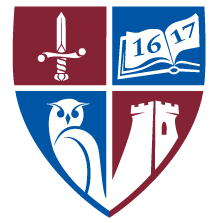 Foyle College live link to website.
Foyle College live link to website. His school days started at the junior school of Foyle College, Londonderry. “I used to walk the distance of over two miles every day along this road, to and from school,” Davie told me when we were driving on that same road to visit his grandmother in 1920.
Davie’s teacher told a characteristic anecdote relating to these years. He said that Davie, a wee boy with bright eyes and a pale face, dark, thin and intelligent, was sitting near the back of a somewhat dark class-room in the famous old ivy-covered school. For some reason, perhaps for talking when silence was the law, or for careless work, the teacher suddenly called out:
“David Campbell, come to the desk.”
As Davie trailed slowly to the front of the class-room, his hands hidden behind his back, the teacher lifted his cane.
‘Hold out your hand,” said the big man. The small boy drew one arm forward and held out a very dirty hand.
The teacher's cane balanced in mid-air and remained there. “Now, look here. I'll give you a chance,” he said. “If you can find another hand in this room as dirty as that one, I'll let you off this time.”
Quick as lightning, Davie's second arm swung forward, and both hands equally dirty, were held out.
Although the children lived in Londonderry for most of the year, they spent the summer holidays at Druckendult in the County of Antrim. There was a very large farm-house, where their mother's family, the Boyds, lived after giving up Greenville. Accordingly, the children grew up against a background of contrasting Irish scenery. There was Donegal of the vast landscapes, where cloud shadows tear across heather-clad slopes, madly driven by the high winds, and giant headlands rise sheer from the sea; and in contrast, the wooded glens of Antrim, gently sloping towards the sunlit coast.
From Londonderry it was easy to get to Donegal. The wind-swept and sandy beach of Dunfanaghy Bay was good for setting up camp. Here they lived in tents, fishing for their daily fare, cooking it themselves with the coastguards’ kind help. On the smaller beaches, they searched eagerly for kitchen middens, where remains of minor archaeological importance could be found, left by prehistoric man. On Seesiagh Lake they learned how to cast a line over surfacing trout, leaving widening circles over the still waters. They climbed Muckish, dominating Donegal in brooding majesty, to add a stone to the great cairn.
The summer at Druckendult meant not only a change of scene, but also an entirely different set of activities, joys, and interests. The Garry Bog was very near to the farm and a constant delight to the boys. They roamed about it for whole days, running lightly over the springy turf of the wind-swept plateau, jumping bog holes, searching for white heather or collecting seagull eggs. Their noisy companions, Billy and Towser, a fox terrier and a collie mongrel, were always in the lead. According to young Davie, they were the best pair of dogs in the county. Then there was the River Bush, so different from the broad, gently flowing Foyle. In the Bush they fished for hours on rainy days, returning home drenched and tired, but full of exciting details of their exploits. Sometimes the children went further afield, wandering through the sunlit glens, down to the coast for a swim in the sea, looking for shells. Even at this age Davie's love of nature showed itself, in his fondness for small animals, birds, fish, and butterflies. He was a little chap of gentle disposition, always ready to help others.
He did well at Foyle College. However, there was a little incident. Paddy Wood, one of the more senior boys, had organized a hunting party of six Red Indians, the youngest of whom was Davie. They were to stalk a wild buffalo in the fields behind the College. Paddy, the ‘Big Chief’ and leader of the Sioux Indians, successfully lodged an arrow in the eye of the buffalo, which happened to be the Headmaster's cow! There were dire results. The cow died; Paddy was expelled and the others were pardoned after a reprimand. Years later when my husband worked in the Secretariat in Dar- es-Salaam, he introduced me to the captain of a tramp steamer, commonly known as ‘the Vomit Line’, plying along the East African coast, from Lindi to Dar-es-Salaam, Klindini and Zanzibar.
“Meet my friend Paddy Wood,” he said. “We went to school together in Derry."
 RSS Feed
RSS Feed